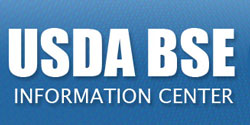The U.S. Department of Agriculture today confirmed the nation’s fourth case of bovine spongiform encephalopathy (BSE) in a dairy cow from central California.
 “The carcass of the animal is being held under State authority at a rendering facility in California and will be destroyed. It was never presented for slaughter for human consumption, so at no time presented a risk to the food supply or human health. Additionally, milk does not transmit BSE,” said USDA Chief Veterinary Officer John Clifford. “Samples from the animal in question were tested at USDA’s National Veterinary Services Laboratories in Ames, Iowa. Confirmatory results using immunohistochemistry and western blot tests confirmed the animal was positive for atypical BSE, a very rare form of the disease not generally associated with an animal consuming infected feed.”
“The carcass of the animal is being held under State authority at a rendering facility in California and will be destroyed. It was never presented for slaughter for human consumption, so at no time presented a risk to the food supply or human health. Additionally, milk does not transmit BSE,” said USDA Chief Veterinary Officer John Clifford. “Samples from the animal in question were tested at USDA’s National Veterinary Services Laboratories in Ames, Iowa. Confirmatory results using immunohistochemistry and western blot tests confirmed the animal was positive for atypical BSE, a very rare form of the disease not generally associated with an animal consuming infected feed.”
National Cattlemen’s Beef Association Cattle Health and Well-being Committee Chairman Tom Talbot noted that BSE is fast approaching eradication worldwide. “According to USDA, there were only 29 cases of BSE worldwide in 2011, which is a 99 percent reduction since the peak in 1992 of more than 37,300 cases,” he said. “We commend USDA and animal health experts for effectively identifying and eliminating the potential risks associated with BSE.”
“American beef and dairy products are safe,” stressed American Farm Bureau Federation president Bob Stallman. “The safeguards our government has in place to detect any incidence of this disease are clearly working. The report of a cow with bovine spongiform encephalopathy, discovered during the pre-rendering process, is proof that our detection system works.”
USDA officials remain confident in the health of the national herd and the safety of beef and dairy products and will “continue to communicate findings in a timely and transparent manner.”
